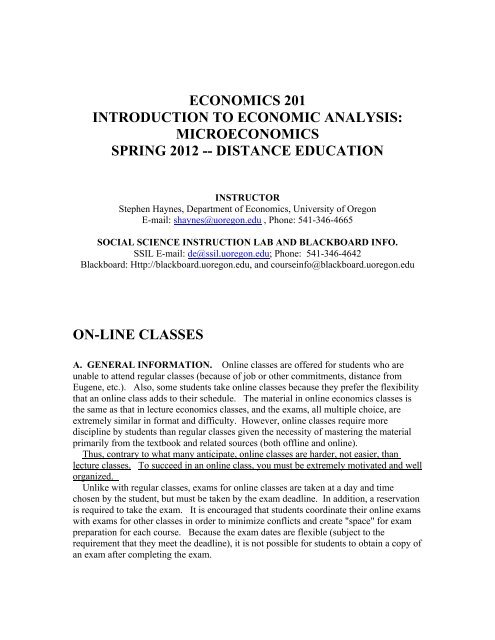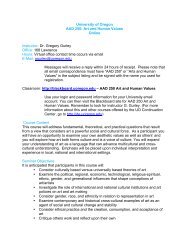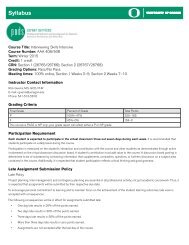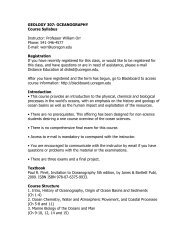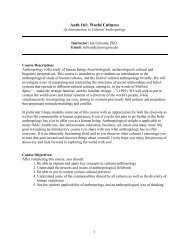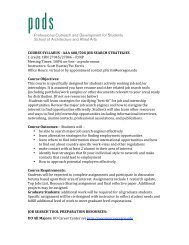Course Syllabus - Distance Education - University of Oregon
Course Syllabus - Distance Education - University of Oregon
Course Syllabus - Distance Education - University of Oregon
You also want an ePaper? Increase the reach of your titles
YUMPU automatically turns print PDFs into web optimized ePapers that Google loves.
ECONOMICS 201<br />
INTRODUCTION TO ECONOMIC ANALYSIS:<br />
MICROECONOMICS<br />
SPRING 2012 -- DISTANCE EDUCATION<br />
INSTRUCTOR<br />
Stephen Haynes, Department <strong>of</strong> Economics, <strong>University</strong> <strong>of</strong> <strong>Oregon</strong><br />
E-mail: shaynes@uoregon.edu , Phone: 541-346-4665<br />
SOCIAL SCIENCE INSTRUCTION LAB AND BLACKBOARD INFO.<br />
SSIL E-mail: de@ssil.uoregon.edu; Phone: 541-346-4642<br />
Blackboard: Http://blackboard.uoregon.edu, and courseinfo@blackboard.uoregon.edu<br />
ON-LINE CLASSES<br />
A. GENERAL INFORMATION. Online classes are <strong>of</strong>fered for students who are<br />
unable to attend regular classes (because <strong>of</strong> job or other commitments, distance from<br />
Eugene, etc.). Also, some students take online classes because they prefer the flexibility<br />
that an online class adds to their schedule. The material in online economics classes is<br />
the same as that in lecture economics classes, and the exams, all multiple choice, are<br />
extremely similar in format and difficulty. However, online classes require more<br />
discipline by students than regular classes given the necessity <strong>of</strong> mastering the material<br />
primarily from the textbook and related sources (both <strong>of</strong>fline and online).<br />
Thus, contrary to what many anticipate, online classes are harder, not easier, than<br />
lecture classes. To succeed in an online class, you must be extremely motivated and well<br />
organized.<br />
Unlike with regular classes, exams for online classes are taken at a day and time<br />
chosen by the student, but must be taken by the exam deadline. In addition, a reservation<br />
is required to take the exam. It is encouraged that students coordinate their online exams<br />
with exams for other classes in order to minimize conflicts and create "space" for exam<br />
preparation for each course. Because the exam dates are flexible (subject to the<br />
requirement that they meet the deadline), it is not possible for students to obtain a copy <strong>of</strong><br />
an exam after completing the exam.
B. EXAMS FOR STUDENTS LIVING IN AND NEAR EUGENE<br />
You will take all your tests at the Social Science Instructional Lab (SSIL) located in<br />
McKenzie Hall 445. All tests are given and scheduled by appointment only!<br />
Before you can schedule an exam, you must complete the on-line introduction by<br />
going to: http://distanceeducation.uoregon.edu/ and clicking on the link under “First time<br />
here”, entitled “Click this link to activate your account.” After you complete the<br />
introduction, you will activate your account and log in using your DuckID and<br />
corresponding password.<br />
From the Test Taker Home Page you can make appointments to take tests, cancel<br />
appointments, see your test scores, e-mail your pr<strong>of</strong>essor, and more. You must go<br />
through the On-Line introduction the first week <strong>of</strong> class. Take the time to read the<br />
information under the link, On Campus. If you have further questions about testing,<br />
contact: de@ssil.uoregon.edu.<br />
Important: you must complete the On-Line Introduction by the end <strong>of</strong> the first week<br />
<strong>of</strong> class.<br />
C. EXAMS FOR STUDENTS WHO DO NOT LIVE NEAR EUGENE<br />
Go to the web site: http://distanceeducation.uoregon.edu/ and click on the Off Campus<br />
link at the bottom <strong>of</strong> the page. Read all the information on the page. Before you can take<br />
a test, you must obtain a proctor and have the proctor approved by SSIL. You must do<br />
this before the end <strong>of</strong> the second week <strong>of</strong> classes. The web page describes how to do<br />
this. There is a link to proctors used by students in the past under the Remote Proctor<br />
sites. These are only locations used in the past. They may no longer be active sites. It is<br />
the students responsibility to locate a proctor. Once you have found a proctor, fill out the<br />
remote site request form on the web page. SSIL will notify you if the proctor you have<br />
chosen is approved. If you have further questions, contact: de@ssil.uoregon.edu .<br />
Important: you must obtain approval <strong>of</strong> the proctor by the end <strong>of</strong> the second week <strong>of</strong><br />
class.<br />
D. BLACKBOARD. Frequent use <strong>of</strong> Blackboard is essential to pass this course,<br />
analogous to the importance <strong>of</strong> class attendance for a lecture class. Thus, you need to<br />
make sure that you can log on to Blackboard at http://blackboard.uoregon.edu, following<br />
the instructions on the homepage <strong>of</strong> Blackboard. Your username will be your "<strong>of</strong>ficial"<br />
UO computing center email account address, but without the “uoregon.edu” at the end,<br />
and the corresponding password for that account. If you have problems logging on,<br />
make sure you can log on to your <strong>of</strong>ficial UO email account, since you might have an old<br />
password. You can also check your <strong>of</strong>ficial UO account on Duck Web. If you still have<br />
problems, contact the computing center for assistance in 151 McKenzie.<br />
Once you log on to Blackboard, click on this course and then click on <strong>Course</strong><br />
Documents. <strong>Course</strong> Documents contains the course syllabus, class emails (with weekly<br />
study checklists), and chapter folders. Each chapter folder contains the chapter summary,<br />
outline, Power Point lectures, several sets <strong>of</strong> practice questions and answers with<br />
explanations, and "active graphs." As the course proceeds, five “assignments” will be<br />
posted in <strong>Course</strong> Assignments on Blackboard. And numerical exam and assignment<br />
scores will be available on Blackboard. The Blackboard addresses are<br />
http://blackboard.uoregon.edu and courseinfo@blackboard.uoregon.edu.<br />
2
E. WEEKLY EMAILS. Emails will be sent weekly to students to provide information<br />
on scheduling <strong>of</strong> exams, material to study for exams, the course assignments, and exam<br />
results. It is essential that you receive and read the class emails carefully.<br />
Important: if you do not receive the emails, contact the instructor ASAP, as you are<br />
probably not using your computing center email account address!<br />
ECONOMICS 201<br />
A. COURSE OVERVIEW. Microeconomics concerns how demand (based on<br />
decisions <strong>of</strong> consumers) and supply (from decisions <strong>of</strong> firms) interact in a price system to<br />
lead to the efficient allocation <strong>of</strong> goods and factors <strong>of</strong> production. Since factors <strong>of</strong><br />
production are scarce, consumers and firms face trade<strong>of</strong>fs. Microeconomics explores<br />
how prices and markets signal relative scarcity, leading to a coordination <strong>of</strong> individual<br />
transactions and efficient allocation <strong>of</strong> these scarce resources. This process answers<br />
three key questions facing all economies -- WHAT goods to produce, HOW these goods<br />
will be produced, and WHO can purchase these goods. Also, microeconomics examines<br />
market complications, e.g., imperfect competition and monopoly; market failures, e.g.,<br />
externalities that lead to pollution; options that are available to the government to address<br />
these complications; and extensions to international economics.<br />
While many <strong>of</strong> the applications in the course may be susceptible to a lively political<br />
debate in other settings, the focus will be on the application <strong>of</strong> the logic <strong>of</strong> economics,<br />
which <strong>of</strong>ten simply amounts to common sense, to illuminate how prices and market<br />
structure influence decisions and outcomes. Diligent students who wish to continue the<br />
study <strong>of</strong> economics should expect to receive the essential theoretical preparation for more<br />
advanced material found in courses for the major. Those who do not wish to continue the<br />
study <strong>of</strong> economics should nevertheless expect to gain an understanding <strong>of</strong> how an<br />
economic way <strong>of</strong> thinking may be constructively applied in practical and illuminating<br />
ways.<br />
B. GRADING: EXAM AND ASSIGNMENT DEADLINES. There are two types <strong>of</strong><br />
evaluations for determining grades in the class. First, there are three exams, totaling 145<br />
multiple choice questions and hence 145 points maximum, which will be taken at the<br />
Social Science Instructional Lab (unless you do not live near Eugene).<br />
Second, there are also five “assignments,” each <strong>of</strong> which consists <strong>of</strong> ten multiple<br />
choice questions typical <strong>of</strong> the type you will see on exams. You will complete these<br />
assignments on Blackboard, and the lowest score <strong>of</strong> the five will be dropped (if you miss<br />
an assignment and receive a zero, this score will be the one dropped), for 40 points<br />
maximum.<br />
The deadlines and grading weights for the exams and assignments and the deadline for<br />
completing the "On-Line Test Taker Introduction," are listed below.<br />
I will assign grades in the course by curving the total points summed over the three<br />
exams and the four “counting” assignments, where there are 185 points maximum that<br />
can be earned from the exams and assignments. Thus, I will not be assigning a formal<br />
letter grade to individual exams; only the total points at the end <strong>of</strong> the term matter.<br />
3
However, after each exam, I will provide sufficient feedback so that you will know how<br />
well you are doing in the class.<br />
"On-Line Introduction" Deadline is Saturday, Apr. 7<br />
PART ONE: Basics <strong>of</strong> MicroEconomics<br />
Assign. 1: 10 Questions Deadline is Saturday, Apr. 14 Weight is 5.4%*<br />
Assign. 2: 10 Questions Deadline is Tuesday, Apr. 24 Weight is 5.4%*<br />
Exam 1: 40 Questions Deadline is Saturday, Apr. 28 Weight is 21.6%<br />
PART TWO: Consumer/Firm Behavior and Market Structure<br />
Assign. 3: 10 Questions Deadline is Saturday, May 12 Weight is 5.4%*<br />
Assign. 4: 10 Questions Deadline is Tuesday, May 22 Weight is 5.4%*<br />
Exam 2: 40 Questions Deadline is Saturday, May 26 Weight is 21.6%<br />
PART THREE: Externalities & International Trade<br />
Assign. 5: 10 Questions Deadline is Saturday, June 9 Weight is 5.4%*<br />
Final: 65 Questions Deadline is Wed, June 13 Weight is 35.1%<br />
NOTE: There are no extra credit points in this course.<br />
*Since the lowest <strong>of</strong> five Assignment scores is dropped, the weights sum to 100%. Thus,<br />
185 points total are available from the three exams and the four “counting” assignments.<br />
C. FOUR IMPORTANT NOTES ON EXAMS, WHICH ARE TAKEN AT SSIL.<br />
First, there will be no exceptions to the exam deadlines, and there are no makeup exams.<br />
You must take an exam by the day <strong>of</strong> the deadline to receive credit for the exam. If a<br />
substantial emergency arises, you must contact the instructor well in advance <strong>of</strong> the<br />
deadline, and submit formal documentation with phone numbers. Second, exams may be<br />
taken prior to the exam deadline, and a reservation is required to take an exam. But do<br />
not wait until the last minute to schedule your exams, as testing slots will fill up fast.<br />
Third, SSIL's webpage allows you to make appointments for exams two weeks in<br />
advance regardless <strong>of</strong> the deadlines given above. For example, if you log on Apr 20 to<br />
make an appointment for exam 1, SSIL will permit you to schedule the exam on, say,<br />
Apr. 29. But note that Apr. 29 is beyond the deadline for exam 1 (by one day), and that<br />
exam will not count! Do not interpret the dates given by the SSIL webpage as extensions<br />
<strong>of</strong> the exam deadlines -- they are not! Fourth, the exams are closed book and closed<br />
notes.<br />
D. FOUR IMPORTANT NOTES ON THE ASSIGNMENTS, WHICH ARE<br />
COMPLETED ON BLACKBOARD. First, analogous to the exams, there will be no<br />
exceptions to the assignment deadlines. You must complete each assignment by the day<br />
<strong>of</strong> the deadline to receive credit, but <strong>of</strong> course can complete it sooner if you wish.<br />
Second, the multiple choice questions on the assignments are taken primarily from the<br />
practice questions QUES posted on Blackboard. Thus, if you wish to do well on the<br />
assignments (and also the exams), you should work and master the QUES questions on<br />
4
Blackboard. Third, these assignments will be completed on Blackboard, with the<br />
procedure detailed in subsequent weekly emails sent to the class, and the lowest score <strong>of</strong><br />
the five will be dropped. Fourth, since the purpose <strong>of</strong> the assignments is to assist in<br />
mastering the course material, the assignments are open book and open notes, and you<br />
will have two chances on each assignment.<br />
E. TEXT AND OTHER LEARNING SOURCES. In addition to the text, there are a<br />
number <strong>of</strong> excellent learning sources and sets <strong>of</strong> practice questions. This material is<br />
especially important to study for online courses.<br />
1. Text: Microeconomics: Principles, Applications, and Tools, by Arthur O'Sullivan,<br />
Steven M. Sheffrin, and Stephen Perez; Prentice Hall, Seventh Edition, 2012.<br />
2. Related Materials, mostly on Blackboard in <strong>Course</strong> Documents, organized by<br />
Chapter.<br />
a. Summary and Outline <strong>of</strong> each chapter. This is from the Instructor's Manual.<br />
The outlines are excellent -- very clear, detailed, and thorough.<br />
b. Power Point development <strong>of</strong> each chapter's topics. Excellent mode <strong>of</strong><br />
presenting the material, especially the graphical points.<br />
c. Muliple Choice "Ques" and "Ans" Practice Questions. These questions with<br />
my answers serve two important functions: they help the student master the material, and<br />
they are excellent samples <strong>of</strong> questions that will appear on the midterms, the final, and<br />
the assignments.These questions are the most important questions to study for the course.<br />
d. Assignment Questions, located under Assignments on Blackboard, are<br />
discussed in detail above. You can earn up to 40 points for the course by doing well on<br />
these Assignment questions.<br />
e. Additional Practice Questions. If you would like more practice questions, there<br />
is an additional source. See the solutions to the questions at the end <strong>of</strong> each chapter in<br />
the text; these solutions are found at the conclusion <strong>of</strong> the first document cited in this<br />
section -- the Summary and Outline <strong>of</strong> each chapter, from the Instructor's Manual.<br />
f. Active Graph presentation <strong>of</strong> each chapter's main points; this is an innovative<br />
manner <strong>of</strong> presenting the graphical material.<br />
3. Weekly Emails with Study Checklists (contact me if you do not receive emails).<br />
a. Emails will both be sent to students and posted on Blackboard.<br />
b. Emails will include essential information about scheduling exams, exam<br />
deadlines, study hints for assignments and exams, etc.<br />
G. WEEKLY READING LIST FOR TEXT, AND CHAPTER COVERAGES BY<br />
ASSIGNMENT AND EXAM. For each chapter, all regular pages are assigned.<br />
However, all appendix pages are omitted, with the exception <strong>of</strong> part <strong>of</strong> the appendix <strong>of</strong><br />
Chapter Seven (see next). If you schedule an exam prior to the deadline date, you will<br />
have to accelerate your study <strong>of</strong> the material relative to the pace outlined next.<br />
Part One: Basics <strong>of</strong> Microeconomics<br />
WEEK ONE (Apr 2-6) INTRODUCTION<br />
Chapter One: What is Economics?<br />
Chapter Two: Key Principles.<br />
5
WEEK TWO (Apr 9-13) MARKETS, SUPPLY, AND DEMAND<br />
Chapter Three: Markets<br />
Chapter Four: Supply, Demand, and Market Equilibrium<br />
DEADLINE FOR ASSIGNMENT ONE: SATURDAY, Apr 14<br />
WEEK THREE (Apr 16-20) ELASTICITY<br />
Chapter Five: Elasticity as a Measure <strong>of</strong> Responsiveness<br />
WEEK FOUR (Apr 23-27) MARKET EFFICIENCY<br />
Chapter Six: Market Efficiency and Government Intervention<br />
DEADLINE FOR ASSIGNMENT TWO: TUESDAY, Apr 24<br />
DEADLINE FOR EXAM ONE: SATURDAY, Apr 28<br />
Part Two: Agent Behavior and Market Structure<br />
WEEK FIVE (Apr 30-May 4) CONSUMER AND FIRM BEHAVIOR<br />
Chapter Seven, plus Appendix (pp. 165-175): Consumer Demand<br />
Chapter Eight: Firm Supply and Production<br />
WEEK SIX (May 7-11) PERFECT COMPETITION AND MONOPOLY<br />
Chapter Nine: Market Structure -- Perfect Competition<br />
Chapter Ten: Market Structure -- Monopoly<br />
DEADLINE FOR ASSIGNMENT THREE: SATURDAY, May 12<br />
WEEK SEVEN (May 14-18) MONOPOLISTIC COMPETITION<br />
Chapter Eleven: Market Structure -- Monopolistic Competition<br />
WEEK EIGHT (May 21-25) OLIGOPOLY<br />
Chapter Twelve: Market Structure -- Oligopoly<br />
DEADLINE FOR ASSIGNMENT FOUR: TUESDAY, May 22<br />
DEADLINE FOR EXAM TWO: SATURDAY, May 26<br />
Part Three: Externalities & International Trade<br />
WEEK NINE (May 28-June 1) PUBLIC CHOICE<br />
Chapter Fifteen: Public Goods and Taxes<br />
WEEK TEN (June 4-8) INTERNATIONAL ECONOMIC ISSUES<br />
Chapter Nineteen: International Trade and Public Policy<br />
DEADLINE FOR ASSIGNMENT FIVE: SATURDAY, June 9<br />
DEADLINE FOR FINAL (CUMULATIVE): WEDNESDAY, June 13<br />
Chapter Coverages by Assignment and Exam for Ec 201:<br />
Assignment One – Chapters One, Two, and Three.<br />
Assignment Two – Chapters Four, Five, and Six.<br />
Exam One – These six chapters listed above.<br />
Assignment Three – Chapters Seven, Eight, and Nine.<br />
Assignment Four – Chapters Ten, Eleven, and Twelve.<br />
Exam Two – These six chapters listed above.<br />
Assign. Five – Chapters Fifteen and Nineteen.<br />
Final Exam – Cumulative.<br />
6


